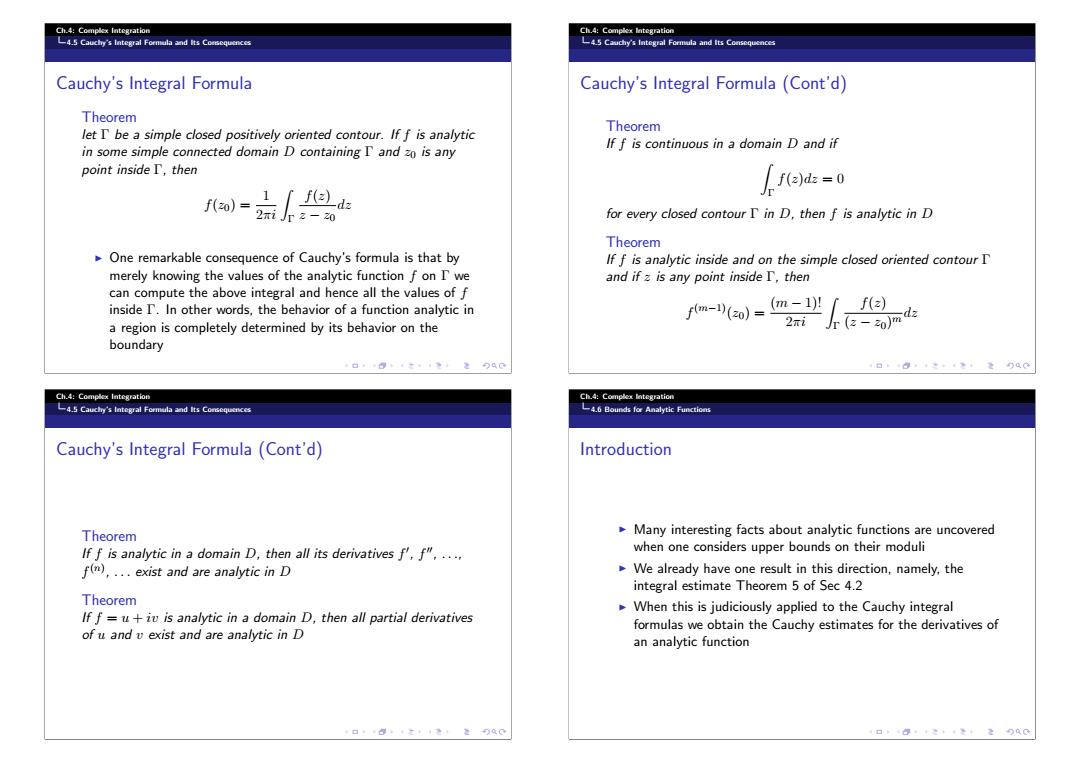正在加载图片...

Ch.4:Complex Integration Ch.4:Complex Integration L4.5 Cauchy's Integral Formula and Its Coesequences L45 Cauchy's Integral Formula and Its Consequences Cauchy's Integral Formula Cauchy's Integral Formula (Cont'd) Theorem let T be a simple closed positively oriented contour.If f is analytic Theorem in some simple connected domain D containing T and zo is any If f is continuous in a domain D and if point inside T,then e地=0 1 f(2o)= f()dz 2miJ外2-20 for every closed contour I in D,then f is analytic in D Theorem One remarkable consequence of Cauchy's formula is that by If f is analytic inside and on the simple closed oriented contour D merely knowing the values of the analytic function f on I we and if z is any point inside T,then can compute the above integral and hence all the values of f inside I.In other words,the behavior of a function analytic in fm-(o)=-m-业 f f(a) (2-0m4 a region is completely determined by its behavior on the 2πi boundary Ch.4:Complex Integration Ch.4:Complex lntegration 4.5 Cauchy's lntegral Formula and Its Co 4.6 Bounds for Analytic Functions Cauchy's Integral Formula(Cont'd) Introduction Theorem Many interesting facts about analytic functions are uncovered If f is analytic in a domain D,then all its derivatives f',f",.... when one considers upper bounds on their moduli f(m),...exist and are analytic in D We already have one result in this direction,namely,the integral estimate Theorem 5 of Sec 4.2 Theorem When this is judiciously applied to the Cauchy integral If f=u+iv is analytic in a domain D,then all partial derivatives formulas we obtain the Cauchy estimates for the derivatives of of u and v exist and are analytic in D an analytic functionCh.4: Complex Integration 4.5 Cauchy’s Integral Formula and Its Consequences Cauchy’s Integral Formula Theorem let Γ be a simple closed positively oriented contour. If f is analytic in some simple connected domain D containing Γ and z0 is any point inside Γ, then f(z0) = 12πi Γ f(z) z − z0 dz One remarkable consequence of Cauchy’s formula is that by merely knowing the values of the analytic function f on Γ we can compute the above integral and hence all the values of f inside Γ. In other words, the behavior of a function analytic in a region is completely determined by its behavior on the boundary Ch.4: Complex Integration 4.5 Cauchy’s Integral Formula and Its Consequences Cauchy’s Integral Formula (Cont’d) Theorem If f is analytic in a domain D, then all its derivatives f, f, ..., f(n), ... exist and are analytic in D Theorem If f = u + iv is analytic in a domain D, then all partial derivatives of u and v exist and are analytic in D Ch.4: Complex Integration 4.5 Cauchy’s Integral Formula and Its Consequences Cauchy’s Integral Formula (Cont’d) Theorem If f is continuous in a domain D and if Γ f(z)dz = 0 for every closed contour Γ in D, then f is analytic in D Theorem If f is analytic inside and on the simple closed oriented contour Γ and if z is any point inside Γ, then f(m−1)(z0) = (m − 1)! 2πi Γ f(z) (z − z0)m dz Ch.4: Complex Integration 4.6 Bounds for Analytic Functions Introduction Many interesting facts about analytic functions are uncovered when one considers upper bounds on their moduli We already have one result in this direction, namely, the integral estimate Theorem 5 of Sec 4.2 When this is judiciously applied to the Cauchy integral formulas we obtain the Cauchy estimates for the derivatives of an analytic function�������